by pmdavis | Apr 8, 2022
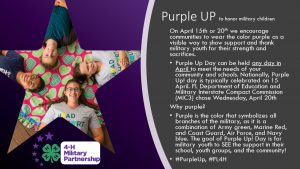
Purple Up! April 15th or 20th
We would like to encourage you to help us celebrate our military youth and honor these young heroes. When we think of honoring our military, we often think of Memorial Day and Veterans Day. Did you know there is also a time identified to honor our youngest heroes, military children? Since 1986, April has been designated Month of the Military Child. Join us in April as we celebrate our military-dependent children.
Strength, sacrifice, and perseverance are words commonly thought of for our military members serving our country. These same attributes are found in our military youth. They send care packages to their military family members and others when they are away from home. They take on new tasks when members of their families are deployed. They grow up with a sense of community and service to country because of what their family members do to make sure we have our freedom. They grow up fast because a parent is away taking care of our country.
The goal is for our military youth to see the support of their communities. If you know a military youth then here are some ideas to help you celebrate them.
- Give them a shout out on social media! Wearing purple to celebrate the Month of the Military Child. If you don’t have or own a purple shirt wear a purple ribbon, tie, headband etc. Why purple?Purple is the color that symbolizes all branches of the military, as it is the combination of Army green, Coast Guard blue, Air Force blue, Marine red and Navy blue.
- Use Hash tags of #PurpleUp, #FL4H, #MOMC for your support photos.
- Just show your support and let our youth know we care about them!
- Thank them for sharing their family member with our country.
- Touch base with them when you know a family member is deployed giving them someone to confide in and seek help from or just listen to their concerns and discuss their worries.
- Tell them you’re proud of them. Sometimes they just need to hear that they’re doing a great job for their family.
- Help them get involved in organizations that help them find their talents.
- Help them research colleges or trade schools they may be interested in applying to.
- Take them out for a special adventure and spend time with the family.
All of these things helps your local youth feel supported. It also allows us to honor military children and their families for their commitment and sacrifice in our communities and not feel so alone. Even if you don’t know a military child you can wear purple and take a photo to share on our local media sites indicating they are cared about! Please Purple UP!
4-H is one of the nation’s most diverse organizations and includes people from all economic, racial, social, political, and geographic categories. There are no barriers to participation by any young person. Participants are given the opportunity to engage in activities that hold their personal interest, while being guided by adult volunteers.
Remember to Purple Up! April 15th, 20th or day of your choosing!
by Claire Davis | Mar 25, 2022
Being in the great outdoors is a great way to spend your time with family! What are some ideas for activities you can do outdoors with your friends and family? Some of the best outdoor activities could include going for a hike, swimming, hunting, kayaking, or even building a campfire. With the weather still cool and a little dry here in Northwest Florida, sitting around a campfire sounds like the right kind of fun! However, it is extremely important to be sure that your campfire does not put anyone at risk of wildfires or burns.
Check out some of the fire safety tips below!
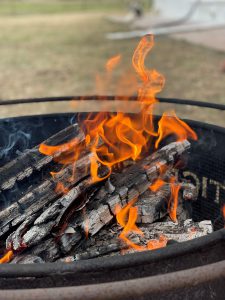
- Use a designated fire pit, if available. If this is not an option, clear a space on the ground, removing any grass or needles that could potentially catch fire.
- Build your fire downwind and away from tents, houses, or anything that is flammable. What does flammable mean? Anything that can easily set fire is flammable. The USDA suggests a minimum of at least 3 feet away from anything that can catch fire.
- Have water or something to douse the fire nearby. In the event of fire escaping its designated area, you will need to be able to put it out swiftly to prevent a wildfire. Consider a water hose that is hooked up to a water source or a fire extinguisher. Also, before leaving your fire site, make sure the fire is extinguished!
- You know the drill! Stop, Drop, and Roll! Make sure that everyone present knows how to put out a clothing fire with these three simple steps.
- Never leave children unattended around a fire. As the adult, it is your responsibility to make sure that everyone is safe! Also, store matches, lighters, and lighter fluids out of children’s sight and reach.
- Think about what you are wearing. Do not wear open toed shoes, as a spark could come off a flame and burn your toe. Instead, wear closed toed shoes while around the fire. Do not wear loose fitting clothing. If you lean over a fire with a baggy t-shirt on, chances are your shirt could catch on fire. Wearing snug-fitting clothing is an easy way to prevent this from happening.
Another “hot” topic is grilling! As we all know, fire and charcoals are extremely hot. Make safe cooking a priority, especially when it comes to outdoor grilling. With summer coming, grilling will become a more popular activity!
A great way for you youth to learn about safe grilling practices is for them to attend a 4-H Tailgate Grilling Camp! This summer,
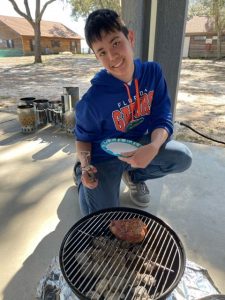
Youth learning to grill pork safely!
Calhoun and Liberty County 4-H Agents, Claire Reach and Marie Arick will be teaming up to offer this program to area youth. Youth will not only learn about the importance of fire safety, but also how to mix rubs or marinades for their meats, and how to grill different animal proteins!
If this is something you think your child or a youth you know might be interested in, stay tuned for upcoming date announcements for summer camps. If you have questions, comments, or concerns, please give us a call at the UF/IFAS Extension Calhoun County Office: (850)-674-8323.
An Equal Opportunity Institution.
Sources:
https://www.firesafekid.org/family-fire-safety/outdoor-fire-safety/
https://www.usfa.fema.gov/downloads/fief/outdoor_fire_safety.pdf
by Julie Pigott Dillard | Mar 18, 2022

Pullet Grand Champion Audrey S.
4-Hers from across the Northwest Extension District wrapped up their 2021-2022 4-H Chick Chain projects at the district show on March 12th. In October, the 4-Hers began caring for their baby chicks in a brooder then transitioned them to a coop. They learned poultry showmanship skills and how to bathe their birds and make them look their best for their show throughout the project. They also learned biosecurity basics to protect their birds and themselves from disease and illness.
The NWD District Chick Chain Show is the culminating experience for this project. After checking in their birds, 4-Hers participated in a skill-a-thon to test their poultry science knowledge. The showmanship contest gave them a chance to show off how they check their birds health, present their bird to the judge, and explain how they care for and prepare their birds for show.
Congratulations to our 2021-2022 4-H Chick Chain Project 4-Hers. Below are the final results for the show.

Pullet Grand Champion Audrey S. & Reserve Ryder H.

Senior Skill-a-thon 2nd place Owen B. &; 1st place Roger N.

Blue ribbon photography Catherine G. &; Alison C.

Junior Showmanship 1st place Kadence A., 2nd place Jocelyn B., 3rd place Kasen M.
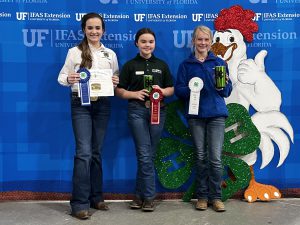
Intermediate Showmanship 1st place Emma W., 2nd place Emily F., 3rd place Adly C.

Senior Showmanship winners 2nd place Owen Bender, 1st place Roger Nemeth
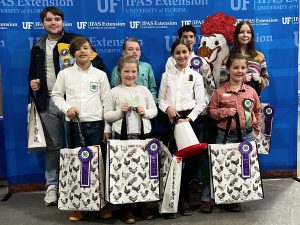
Best of Breed Winners-Australorp-Blair P., Brahma-Audrey S., Delaware-Samuel R., Plymouth Rock-Jocelyn B., Orpington-Ryder H., Rhode Island Red-Riley B., Sussex-Aubrey M., Wyandotte-Owen B.

Production Division-Grand Champion Colton H. & Reserve Emma W.
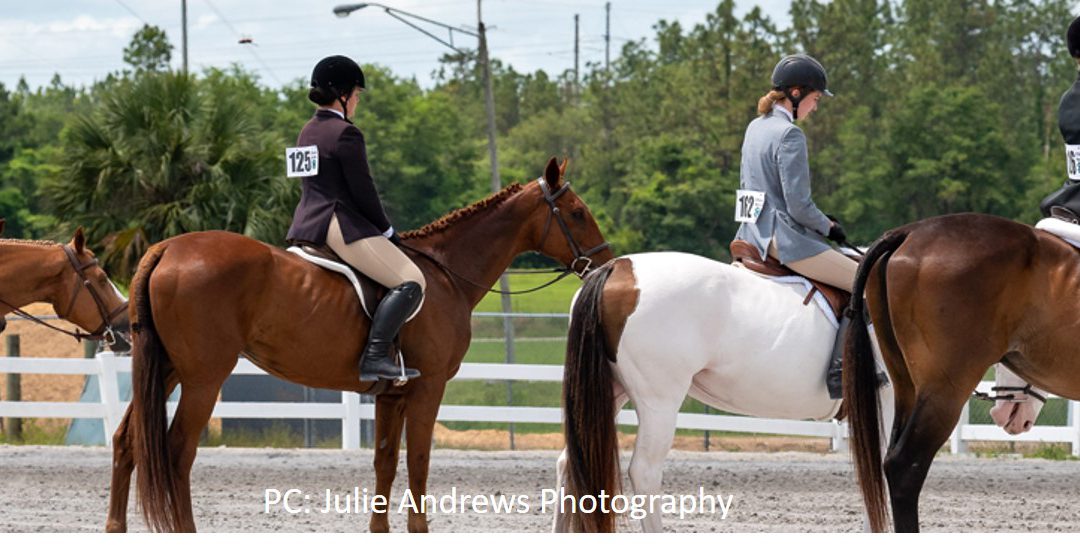
by aschortinghouse | Mar 11, 2022
In 2022, there have been some shifts in the area to state horse show qualification guidelines. In years past youth have an assigned area horse show they must participate in through which they can qualify for the state horse show. Due to a couple of areas being unable to host their shows for various reasons, the two remaining area shows have been opened up to accommodate the qualifying process. As such, there are new guidelines and stipulations everyone should be aware of.
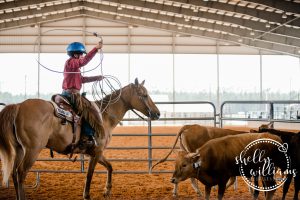
4-H Youth participating at Area Horse Show.
- For the 2022 show year only, a 4-H member may elect to show at any Area show of their choice to qualify for the state show. Ideally, youth will select to compete in their own area show first, as this is the most convenient to them.
- Qualification for the state show is based on the participation and qualification at the Area level.
This complex process is new for this year, so if you plan to show at the Area North Show, we recommend reading the 2022 plan passed out by the state thoroughly. That plan can be found here: https://animal.ifas.ufl.edu/extension/youth/horse/4h-shows/area-shows/.
The Area North Show is held in Green Cove Springs, Florida at the Clay County Fairgrounds. Show dates for 2022, are April 29-30. If you have any questions or concerns about these changes, please follow up with your 4-H agent, so that any questions can be addressed before the close of Area North Horse Show registration on April 1, 2022.
by Claire Davis | Feb 11, 2022
Like me, you make ask, what is a “sense of belonging”? Have you ever felt out of place when going to a club, meeting, or gathering? Do you remember how it made you feel? Maybe you were nervous, had a funny feeling in your stomach, a knot in your throat, or weren’t sure if you belonged?

Volunteer working with youth. Calhoun County Animal Science Camp 2021
One of the essential elements of 4-H Youth Development is belonging. Youth members need to know that they are important to you, cared for by others, and feel a sense of connection to the group they are in! As a facilitator of a 4-H activity, whether that be volunteer, adult, or Extension agent, it is important to provide youth with a safe, inclusive environment when participating in groups. When the facilitator creates a space where youth feel physically and emotionally safe, youth tend to form positive relationships with their peers and role models. Feeling connected to others will affect their behavior, mental health, academics, as well as other life skills. Creating this sense of belonging for all participants is a solid foundation to build a program on!
Now you may be asking, how on earth can I create a sense of belonging?
Since you are the adult facilitator in this setting, it’s your job to provide youth with the opportunity to feel safe during activities. To do this, use discussion questions that engage all the youth members, and encourage them to learn from each other. Below are a few ideas to foster this sense of belonging.
- Welcome new members. Youth who are already part of the group will feel more comfortable than those that are just starting. Assign existing members a role in welcoming newcomers, similar to a welcoming committee. 4-H and other group activities like team sports, can be overwhelming because there is a lot of information given, so think about preparing welcome packets for new members or families. These packets could include information on how to enroll in 4-H Online, club calendars, brochures, frequently asked questions, contact information, and more!
- Ice breakers. Ice breakers and team building activities are really important to help all members feel
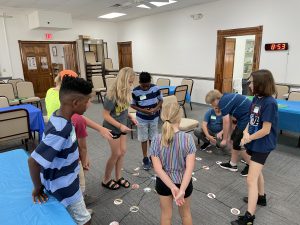
Calhoun County Animal Science Camp Ice-Breaker. What is Agriculture? Summer 2021
comfortable with each other! These types of interactions help build relationships within the group. These are helpful when a group is just starting out, as well as continuing to build bonds overtime. Being deliberate in choosing these types of activities will help any group feel more cohesive. Adjust the activity to suit the group that is participating. Keep it simple for cloverbud age youth (5-7) or add challenges if the group is older or has been together for a period of time. “Ice breakers, get acquainted games, or even roll calls that ask questions about member’s interests (answer roll by making the sound of your favorite animal) can help members get to know each other better.” (Kent, 2015)
- Create a safe space. It may seem easy to create a safe space for youth and other adults but it’s much more difficult in practice! We all think about keeping youth safe physically, but what about the emotional aspect of safety? We must be aware of “microaggressions”, which is defined as a statement, action, or incident regarded as an instance of indirect, subtle, or unintentional discrimination against members of a marginalized group such as a racial or ethnic minority. As a leader, you will want to be able to identify these so you can educate and redirect the situation. It is our job, as adults, to help youth, and other adults, understand the impacts of their words. Creating a shared set of ground rules for everyone to follow can help everyone feel comfortable, knowing the expectations of the group as well as having a voice in creating the space.
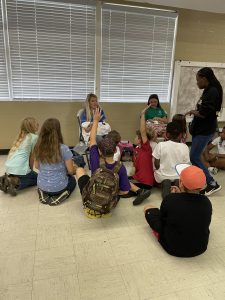
Intro to Animal Handling- Gulf County Summer Camp 2021
- Encourage engagement. Engaging youth members can be done in multiple ways! Various options include using discussion questions, club committees, or even silly ice breaker games – anything constructive to grab and hold their attention. Using discussion questions allows youth to learn from each other while also encouraging a sense of curiosity for life-long learning. Having different committees allows for smaller work groups, which is much less intimidating than a single large group. It is easier for opinions and thoughts to be heard in a smaller setting. Ice breakers may seem silly, but they are a fun and wonderful way to get youth involved.
While a sense of belonging is important for youth, it may take some time and intentionality to create the space to provide the sense of belonging. Our youth members come from all different walks of life and as the adult leader, you must think about the challenges youth may face that makes them different. Some youth may look different physically; some may come from a family that has never done 4-H; some may have experienced trauma; some may have special needs.
A 4-H club, program, or activity can provide a space that youth belong to, as well as allowing them to learn invaluable life skills. Adults, volunteers, and agents are essential to creating this space, while also helping other members see how to increase the sense of belonging for others. What will you do to help make all members feel welcome?
Sources:
https://www.canr.msu.edu/news/essential-elements-of-4-h-belonging
Creating a Welcoming Environment in 4-H Clubs
by pmdavis | Feb 2, 2022
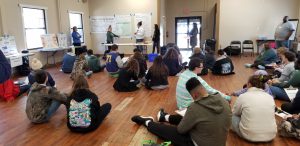
Youth at teen retreat learning about financial literacy
The Northwest District 4-H Teen Retreat registration will close Feburary 7th. The actual event will be 25-27 @ Timpoochee 4-H Center. This weekend features leadership building and fun workshops for 12-18 years old youth.
Register NOW in 4honline for the NWD 4-H District Teen Retreat at 4-H Camp Timpoochee.
Friday’s Schedule
6:00-7:15 pm – Check-in & pizza
7:15pm – Welcome & District Intros
8:00 pm – Campfire
Saturday’s Schedule
8:30am – Breakfast
9:15am – Group Pic
9:30-11:30am – Workshop Sessions
12:00pm – Lunch
1:00-2:45pm – FUNshop Sessions
3:00pm – Rec Time – 4-Hers vs Agents Kickball & Nine-Square
5:00pm – Service Project
6:00pm – Dinner
7:00pm – District & State Events Reports
7:30pm – Dance, Games & Snacks
9:00pm – Music, Campfire & Smore’s
Sunday’s Schedule
7:00pm – Rise & Shine, pack-up
When I ask the youth that attended previously what they got out of the program? They said they learned how to interview for a job, how to write a resume, and find college scholarships. Another teen said, I met really nice people from other counties and how to decorate cakes. A third memeber said she learned how to start managing her money.
For more information contact your 4-H Agent. We can’t wait to see you at the 2022 NWD 4-H Teen Retreat!


















